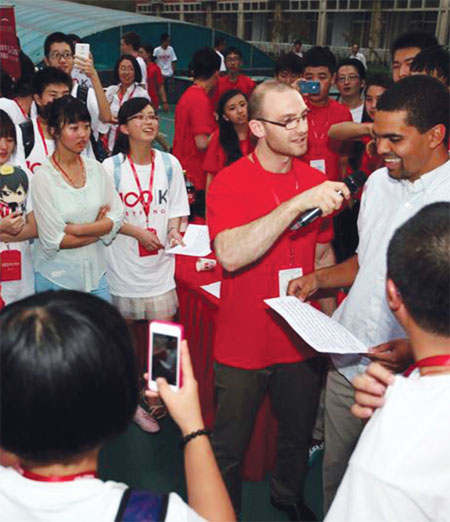 |
|
Chinese and US students read tongue-twisters from each other's culture as one of the evening social activities at Tsinghua University Affiliated High School during the US-China Student Summit on May 31 in Beijing. Provided to China Daily
|
This summer Steve Losos from Chicago, who attends Illinois Wesleyan University, and Fernando Braga, a New Yorker from Vassar College, were linked together because of the first ever US-China Student Summit (USCSS) in Beijing.
USCSS is a two-day event that brought Chinese and US college students together for various activities, including travel to Chinese cities, speeches, campus visits to Chinese universities and small-group discussions.
Prior to the summit, delegations explored Shanghai and Beijing, for cultural experiences, visits to local businesses and school tours for 10 days.
The trip was organized and partially funded by the 100,000 Strong Foundation which encourages students of diverse backgrounds from across the country to learn Mandarin and study in China and WorldStrides, a private company that organizes student tours.
The total fee for the program is $3,985 per student while $100,000 need-based scholarships were distributed to the delegates. Students register for the program in three different ways: school delegation, at-large delegate, and exchange student delegate.
The program's goal is tooffer chances for US undergraduate college students to "open up to China", said Jim Creighton, the senior vice-president of WorldStrides.
He added: "100,000 Strong is not only looking for students who already have an interest in China and have learned Chinese, but also to spark interest in students who might not consider China as a first choice when it comes studying abroad."
About 200 students from 50 US colleges were selected to attend the summit, Richard Lin, president of WorldStrides in China, told China Daily in an interview.
"What we're most proud of about this program is the two-day summit that took place at Peking University," said Creighton.
The students, nearly 200 from the US and 200 from China, met for two days in Beijing to hear from speakers like the US ambassador to China, business leaders, the head of the China Education Association for International Exchange, and learn about the two countries and the relationship between China and US.
The 200 Chinese students are selected from top institutions in China, including Peking University, Tsinghua University and Beijing Foreign Studies University. "All Chinese delegates got recommendations from their schools and their English was pretty good so there wasn't any communication barriers." Lin said.
Commenting on the Chinese students at the summit, Creighton said, "I think some of them were hesitant in the very beginning of the program because the event was held in English, but over the course of the two days, Chinese students become more comfortable and there was great interaction in the group."
He added: "Many of the US students pointed out, the English of the Chinese students was much better than the Chinese of any US students.
"The Chinese are more responsive to our culture than we are to theirs," said Losos.
Braga said: "Their English was amazing and Chinese students know almost everything that we know, like movies, world events, anything, I found that different than what I was expecting and positive.We (US students and Chinese students) aren't that different. It was the best part to speak with them and really understand that a thousand miles away, it doesn't change the way people think," he said.
As a senior majoring in international business, economics and Chinese, Losos said going to China to study the culture and environment was his goal. "I got more out of the entire 10 days than I can get out of classes. The 10 days is definitely the highlight of my college years."
Braga said he had a great time learning Chinese from one of the cab drivers he met during his visit in Shanghai. "He was the best language teacher I've ever had, he taught me how to tell another cab driver to get to our hotel. I still do remember the tone, the intonation; it's hard to learn that in classroom."
Both Losos and Braga are planning going back to China next summer.
The 100,000 Strong Foundation announced last week that President Obama's goal of seeing 100,000 Americans study in China has been reached and will be far surpassed by the end of 2014. USCSS recently opened the registration for the second annual event on its website.
According to Lin, about 20 schools have contacted them for next year's program.
We recommend:
